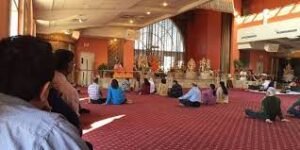Introduction
In a significant development in Canada, Canadian MP Melissa Lantsman has tabled a petition in the House of Commons, calling for the recognition of Hinduphobia. This petition, labeled e-4507, had garnered an impressive 25,794 signatures by its closure date on October 17. The move aims to address the increasing instances of attacks and discrimination against the Hindu community, particularly in their places of worship. In this article, we will delve into the details of this petition and the broader implications of recognizing Hinduphobia in Canada.
The Rising Concern: Hinduphobia in Canada
Canadian MP Melissa Lantsman, who also serves as the deputy leader of the Conservative Party in the House, emphasized the importance of recognizing Hinduphobia during her address in the House of Commons. She noted that the Hindu community in Canada has witnessed a surge in attacks against their places of worship, which is a matter of grave concern. Lantsman stressed the fundamental right of every individual in Canada to have a safe place to worship without fear of intimidation, violence, harassment, or vandalism.

Negative Stereotypes and Prejudice
One of the central issues highlighted in the petition is the growing negative stereotypes and prejudice faced by Canadian Hindus. This discrimination is not limited to places of worship but extends to workplaces, schools, and communities. Moreover, the traditions and cultures of Hinduism are often misrepresented and misunderstood, contributing to the challenges faced by the community. Recognizing Hinduphobia is a step toward addressing and rectifying these issues.
Hindu Heritage Month: A Fitting Timing
It’s worth noting that the petition was presented on the second day of what is officially observed as Hindu Heritage Month in Canada. This timing emphasizes the cultural and historical significance of the Hindu community within the country. The recognition of Hinduphobia during this month underscores the importance of preserving and respecting the diverse cultures that contribute to the Canadian mosaic.

The Content of the Petition
The petition, which received support from 80 community organizations, including major temples, has several key objectives. These objectives call upon the House of Commons to:
1. Recognize Hinduphobia as a term in the glossary of terms in the Human Rights Code to describe anti-Hindu prejudice and discrimination.
2. Define Hinduphobia as denial, negation, prejudice, or vilification against Hindus, Hinduism, or Hinduness.
3. Raise awareness and address systemic and institutional Hinduphobia.
The petition’s content reflects a comprehensive approach to addressing the issues faced by the Hindu community in Canada and promoting a more inclusive society.
The Role of Sikhs for Justice (SFJ)
The petition gained momentum following a controversial video released by the secessionist group Sikhs for Justice (SFJ) in September. The video targeted Canadian Hindus of Indian origin and called for them to leave Canada and return to India. The video also accused them of supporting the suppression of speech and expression of pro-Khalistan Sikhs and promoting violence.
This video further strained relations between India and Canada after Prime Minister Justin Trudeau’s statement in the House of Commons on September 18, where he mentioned “credible allegations” of a potential link between the crime (the killing of SFJ’s principal figure Hardeep Singh Nijjar) and Indian agents. The video, along with other instances of temple desecration, has drawn attention to the issue of Hinduphobia in Canada.
Recognizing Hinduphobia: A Cross-Party Effort
It is essential to highlight that the recognition of Hinduphobia is not limited to one political party in Canada. In April of the same year, Pierre Poilievre, the leader of the Conservative Party, expressed the need to combat Hinduphobia, emphasizing the unacceptability of negative comments and acts of violence targeting Hindu Canadians. This demonstrates that addressing Hinduphobia is a concern that transcends political affiliations and is a shared goal among Canadian leaders.
Additionally, in January, Liberal Party MP Chandra Arya spoke in the House of Commons about rising Hinduphobia, drawing parallels with Islamophobia and anti-Semitism, which have resulted in hate crimes against mosques and synagogues. This acknowledgment underscores the significance of recognizing and combating Hinduphobia as part of a broader effort to combat religious discrimination and hatred in Canada.
Conclusion
The petition tabled by Canadian MP Melissa Lantsman calling for the recognition of Hinduphobia in Canada is a crucial step towards creating a more inclusive and respectful society. It addresses the rising concerns of attacks, discrimination, and negative stereotypes faced by the Hindu community in the country. Recognizing Hinduphobia is not a matter of politics but a shared goal among Canadian leaders to ensure that all individuals, regardless of their religious beliefs, can worship and live without fear of intimidation and violence. As Canada continues to celebrate its diverse cultural mosaic, this petition serves as a reminder of the importance of protecting and respecting the rights and traditions of all communities within its borders.











Comments 1